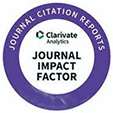EFFECT OF THE REDUCTION TEMPERATURE INTO CATALYTIC ACTIVITY OF Ni SUPPORTED BY TiO2, AL2O2 AND TiO2/AL2O3 FOR CONVERSION CO2 INTO METHANE
Hery Haerudin(1*), Wihatmoko Waskitoaji(2), Usman Usman(3)
(1) Pusat Penelitian Kimia - LIPI, Kawasan Puspiptek, Serpong, Tangerang
(2) Pusat Penelitian Kimia - LIPI, Kawasan Puspiptek, Serpong, Tangerang
(3) Jurusan Kimia, FMIPA, Universitas Haluoleo, Kendari
(*) Corresponding Author
Abstract
Nickel catalysts, containing 6% (w/w) of nickel, have been prepared using TiO2, Al2O3 and mixture of TiO2-Al2O3 (1:9). The catalysts were used for CO2 conversion into methane. The characteristics of catalysts were studied by determination of its specific surface area, temperature programmed reaction technique and X-ray diffraction. The specific surface area were varied slightly by different temperature of reduction, namely after reduction at 300°C it was 39, 120 and 113 m2/g and after reduction at 400°C it was 42, 135 and 120 m2/g for 6% nickel catalysts supported on TiO2, Al2O3 and mixture of TiO2-Al2O3 (1:9) respectively. Temperature program reaction studies (TPO and TPR) showed that NiTiOx species were possibly formed during the pretreatments which has shown by the shift of its peak to the lower temperature on Ni catalyst, that supported on mixture of TiO2-Al2O3 compared with catalysts supported on individual TiO2 or Al2O3. The nickel species on reduced Ni catalysts supported on TiO2 and on mixture of TiO2-Al2O3 could be detected by X-ray diffraction. The catalyst's activities toward CH4 formation were affected by the reduction temperature. Activity for CH4 formation was decreased in the following order: Ni/ TiO2 > Ni/ TiO2: Al2O3 > Ni/ Al2O3 and Ni/ TiO2: Al2O3 > Ni/ TiO2> Ni/ Al2O3, when catalysts were reduced at 300°C or 400°C respectively. The CO2 conversion was decreased in the following order: Ni/ Al2O3 > Ni/ TiO2: Al2O3 > Ni/ TiO2 when catalysts were reduced at 300°C or 400°C respectively.
Keywords
Full Text:
Full Text PdfReferences
[1] McCarty J.G., and Wise, H. 1979, J. Catal., 57, 406-416
[2] Maatman R. and Hiemstra, S., 1980, J. Catal., 62, 349-356
[3] Vance C.K., and Bartholomew, C.H., 1983, Appl. Catal., 7, 169-177
[4] Yip-Wah, C., Xiong, G., and Chiah-Chieh, K., 1984, J. Catal., 85, 237-243
[5] Bartholomew C.H., and Vance, C.K., 1985, J. Catal., 91, 78-84.
[6] Hayes R.E., Thomas, W.J. and Hayes, K.E. 1985, J. Catal., 92, 312-326
[7] Kroll V.C.H., Swaan, H.M., and Mirodatos, C., 1996, J. Catal., 161, 409-422
[8] Chang-Wei, H., Yao, J., Hua-Qing, Y., Yu C., and An-Min, T., 1997, J. Catal., 166, 1-7
[9] Marcelin G, and Lester, J.E., 1985, J. Catal., 93, 270-278.
[10] Haerudin H., Bertel, S., and Kramer, R., 1998, J. Chem. Soc., Faraday Trans., 94(10), 1481-1487
[11] Pajonk G.M., and Teichner S.J., 1986, Sci. Catal., 27. 119-296
[12] Hayek K., Kramer, R., and Pall, Z., 1997, App. Catal. A: General 162, 1-15
[13] Ho S.W., Chi-Yang, C., and Shih-Guan C., 1998, J. Catal., 178, 34-48
[14] Damyanova S., Spojakina A., and Jiratova K., 1995, Appl. Catal. A: General 125, 257-269
[15] Tetsunori, N., Arai, M., and Nishiyama, Y., 1983, J. Catal., 79, 497-500
[16] Solymosi F., Erdohelyi, A., and Bansagi, T., 1981, J. Catal., 68, 371-382
[17] Marinas, J.M., Campelo, J.M., and Luna, D. 1986, New Supported Metallic Nickel System, Studies in Surface Science and Catalysis Vol. 27. Catalytic Hydrogenation, L. Cerveny (ed.), Amsterdam, 411-450
[18] Satterfield C.N., 1991, Heterogeneous Catalysis in Industrial Practice, McGraw-Hill, Inc. New York
Article Metrics
Copyright (c) 2010 Indonesian Journal of Chemistry

This work is licensed under a Creative Commons Attribution-NonCommercial-NoDerivatives 4.0 International License.
Indonesian Journal of Chemistry (ISSN 1411-9420 /e-ISSN 2460-1578) - Chemistry Department, Universitas Gadjah Mada, Indonesia.












